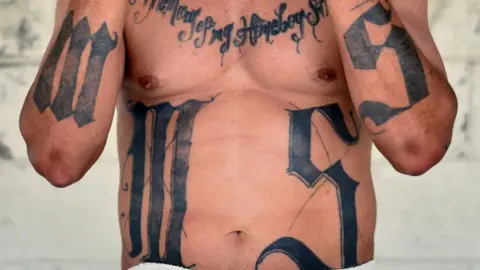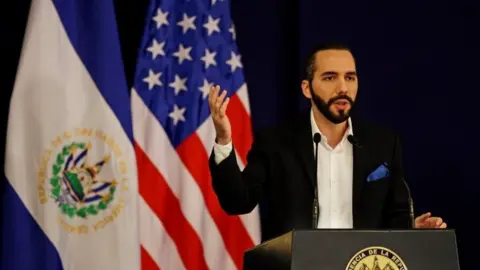El Salvador granted favours to jailed gang leaders, report says
 Getty Images
Getty ImagesThe government of El Salvador has allegedly granted favours to the imprisoned leaders of street gangs in return for support in elections, according to a media report.
Online newspaper El Faro said the gang leaders were asked to reduce violence and support President Nayib Bukele.
The report said the favours ranged from better food to the reversal of a decision to house members of rival gangs in the same cells.
Mr Bukele has rejected the allegations.
The president, who came to office in June 2019, has repeatedly portrayed his administration as tough on El Salvador's gangs.
El Faro alleged that the government had secret talks with the leaders of the country's main street gangs, including the notorious Mara Salvatrucha, also known as MS-13.
Citing a large number of official documents, El Faro claims that Mr Bukele's administration has made concessions to the gang leaders in prison in exchange for a reduction in violence and backing at the polls.
The report said the favours ranged from small luxuries in terms of improved food and the removal of the most repressive guards to bigger steps like reversing the recent high-profile decision to house members of rival gangs in the same cells.
 EPA
EPAClaims that the government of El Salvador has been negotiating behind the scenes with jailed drug gang members are not normally very surprising, BBC Central America correspondent Will Grant reports.
What stands out in the allegations are that such negotiations were allegedly being carried out by the administration of President Bukele, who has repeatedly portrayed his government as uncompromisingly hard on El Salvador's gangs, our correspondent adds.
Successive governments have been accused of speaking directly to the leaders of the two main street gangs, the MS-13 and 18th Street or Barrio 18, as a means to reduce drug violence.
President Bukele took to Twitter to deny the allegations, and posted photos of jail courtyards full of half-naked prisoners with shaved heads and challenging his critics to "show me one privilege" that those prisoners had received.
